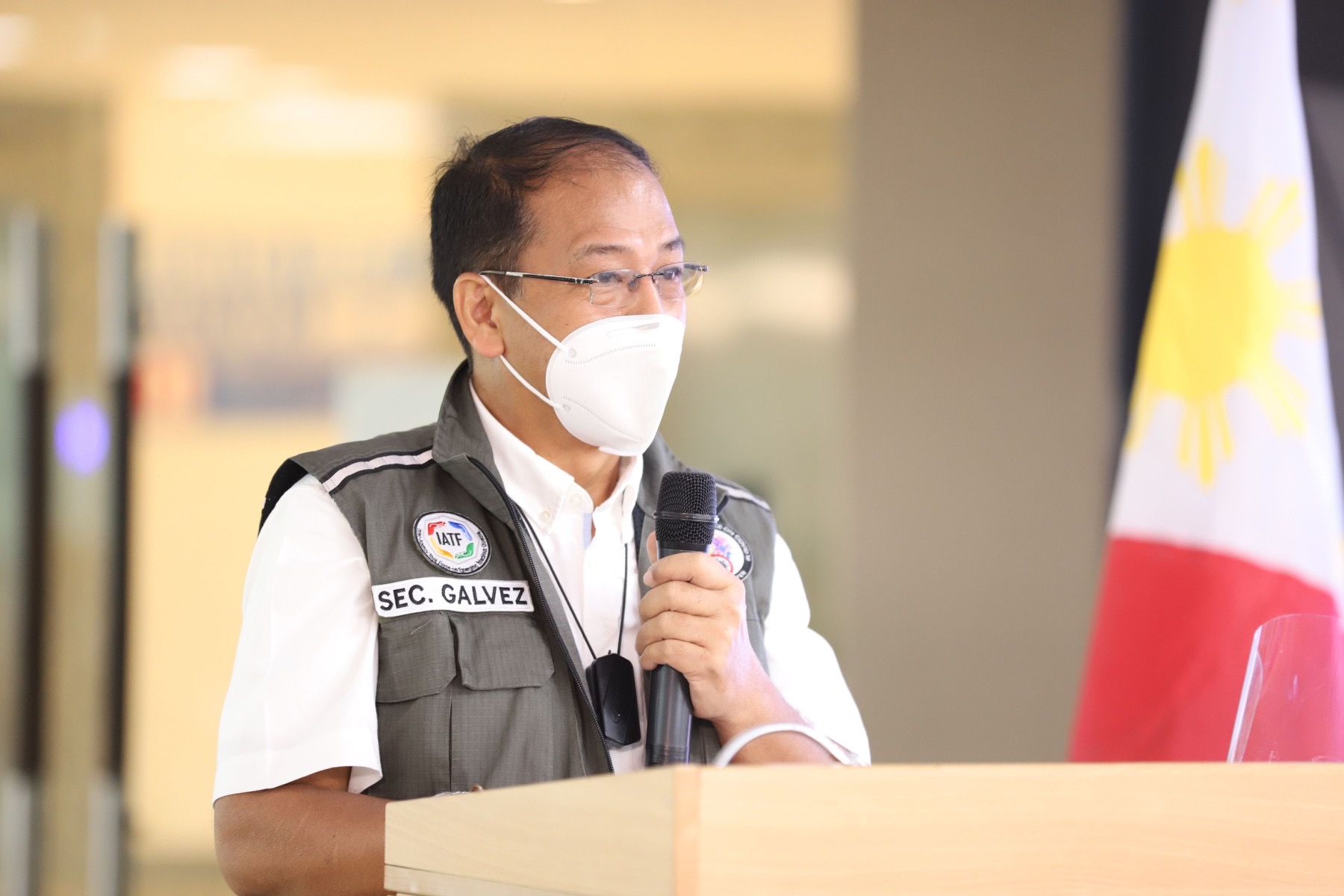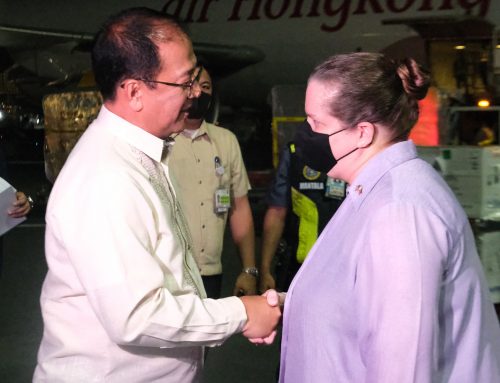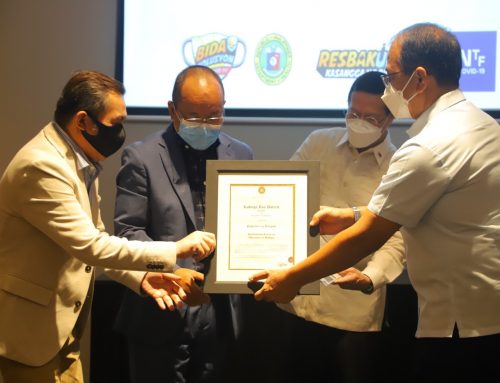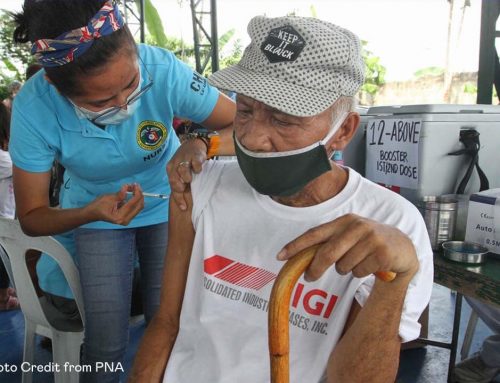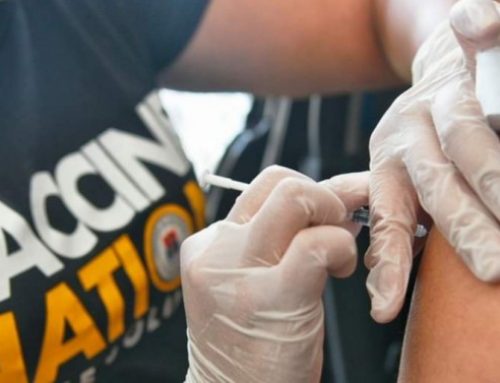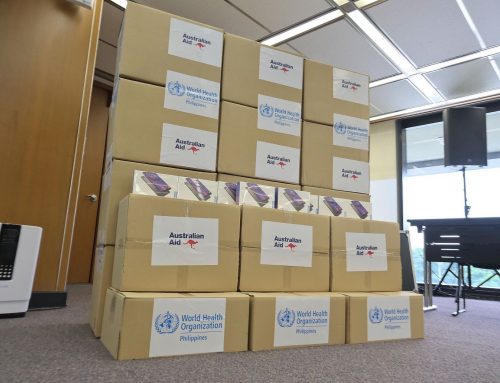PASAY CITY (25 AUGUST 2021)— The national government is dealing directly with vaccine manufacturers and does not entertain private “intermediaries” in its procurement of COVID-19 vaccines, as doing so will only complicate and muddle the negotiation process.
This was clarified by Secretary Carlito G. Galvez, Jr., vaccine czar and National Task Force against COVID-19 chief implementer, during the Senate Blue Ribbon Committee hearing on the findings of the 2020 COA report regarding the budget utilization of the Department of Health (DOH), particularly for its expenditures related to the nation’s fight against COVID-19.
“In our dealings carried out under tripartite agreements, we are directly communicating with vaccine manufacturers,” Galvez said, which is different from the case of India’s Bharat Biotech, the maker of Covaxin, wherein the government has to engage with an intermediary.
The vaccine czar was responding to an inquiry made by Senator Juan Miguel Zubiri, regarding tripartite or multi-party agreements (MPA) made by local government units and private companies with the national government that are currently on hold at the level of the NTF.
According to Galvez, the current procurement process for Covaxin is unlike the deals the national government has entered into with other vaccine makers such as Moderna and AstraZeneca.
“The question is why do we have to (go through) intermediaries? It will create a lot of questions on the pricing because we involve more players,” Galvez said.
“Hindi po transparent (ang parties involved). So they’re signing (a) negotiation with the LGU, and they’re asking for advance commitment na wala po sa law ‘yan. Dapat kasama ang NTF sanegotiation,” he added.
The procurement of Covaxin has yet to secure a recommendation from the Health Technology Assessment Council (HTAC), which is required under the Universal Health Care Law (R.A. 11223) and the COVID-19 Vaccination Program Act of 2021 (R.A. 11525).
And with the current surge in COVID-19 cases in India, Galvez said India has already announced that they are unable to ship the vaccine orders this year and could only resume the deliveries in 2022.
In a report from Bloomberg on August 24, the news article quoted N.K. Arora, chairman of the National Technical Advisory Group on Immunization in India, saying that “As soon as we are through with our adult population we should have sufficient vaccine to share with the rest of the world.”
According to the report, India has halted its vaccine export since April as its government prioritizes the inoculation of its 1.3 billion population triggered by the “devastating second-wave” COVID -19 infections. So far, India has so far vaccinated “more than 589 million doses, but even that huge coverage has only fully vaccinated about 10% of the population, according to Bloomberg’s vaccine tracker.”
Galvez said even if the tripartite with Covaxin will push through, its delivery will still be in 2022 by that time several vaccines like Pfizer or Moderna will likely be available commercially in the country, where LGUs and even private institutions can buy it directly sans the multi-party agreements.
Due diligence
According to Galvez, the NTF recognizes the major contribution of local government units (LGUs) and the private sector in the national vaccination program, particularly their willingness to use their own funds to help the national government secure more vaccines.
However, he said that the NTF must conduct “due diligence” prior to the approval of these MPAs primarily to protect the interests of the LGUs, as well as private entities who plan to enter into such agreements.
“Mr. President, noong binigyan n’yo kami ng directive at naisapasa ang batas allowing the tripartite agreement for vaccine procurement, ang talagang pinakaunang siniguro namin ay hindi mapahamak ang LGU at saka ‘yung private sector sa pagbili ng mga mahal na vaccine,” Galvez said during the President’s Talk to the People televised address on Tuesday.
“Linilinaw po namin na hindi po hino-hold ‘yung tripartite agreement, hindi po namin dini-delay. Ang ginagawa lang po namin is ‘yung due diligence para masiguro at maprotektahanang pera ng LGU at private sector at hindi sila mapahamak,” Galvez added.
The vaccine czar said the vaccine manufacturers the national government are negotiating with are either no longer accepting MPAs or not yet open for this kind of arrangement due to production supply and other logistical issues.
“Ang gusto nila [manufacturers] isa lang ang kausap. Ang sabi kasi kapag maraming kausap, it will entail an enlargement of their personnel, at saka medyo may challenge on logistical arrangements. Dahil kung 300 ang LGU, lahat po ‘yan ay silaang mag-aasikaso ng deliveries,” he said.
Galvez noted that in contrast to MPAs where there are a lot of personalities and groups involved, vaccine manufacturers only need to deal with one procuring entity when negotiating with the national government.
Due to the dynamics involved in negotiating MPAs, he said that vaccine makers such as Sinovac and Gamaleya (for Sputnik V) have already expressed their intention to prioritize vaccine orders from the national government.
Galvez said Astrazeneca and Moderna, which have forged MPAs with LGUs and the private sector for 17 million doses and seven million doses, respectively, are no longer accepting new vaccine orders under the tripartite agreement.
Galvez said the two manufacturers will be entertaining new vaccine orders under MPAs, but this is just for booster shots and for the latest generation of vaccines.
“Ang ibig sabihin nito ay ibang produkto na ‘yung io-offer nila. Hindi na ‘yung mga bakunang nauna na nating binili at kasalukuyang dini-deliver,” he said.
“Kaya ‘yun ang hinihintay natin, ang magkaroon ng presentation para sa mga bagong klaseng mga bakuna na maaaring mabili ng mga LGU at private sector,” Galvez added.
Johnson & Johnson and Pfizer, he said, from the start are not open to signing MPAs.
The NTF expects that Pfizer will soon apply for a Certificate of Product Registration (CPR) in the Philippines with its full approval recently with US Food and Drugs Authority.
Once granted with a CPR, the vaccine will be commercially available and can be easily purchased by LGUs and the private sector.
Galvez said the MPAs for Novavax cannot be pursued yet, as the vaccine maker still has to receive its Emergency Use Authorization (EUA) from the United States and their manufacturing country, India.
He gave the assurance that once Novavax’ EUA has been approved and the company begins exporting its vaccines, the NTF will be facilitating requests for MPAs
Enough vaccine supply
Galvez emphasized that the country has already secured more than enough vaccine doses this year to inoculate 70% of the Philippine population.
He said that more than 190 million doses have been secured through procurement by the national government, MPAs with LGUs and private sector, and donations from COVAX and partner nations.
Out of this number, 48,885,590 doses have been delivered to the country as of August 25.
More than half or 57.96% of the vaccine supply was procured by the national government, followed by donations from the COVAX facility (27%), deliveries under MPAs (7%), and bilateral donations (7%).
As of August 24, a total of 41,978,360 vaccine doses have been deployed nationwide, while 31,099,893 doses were administered since the start of the vaccine rollout in March.
Galvez shared that more than 13 million Filipinos or 17% of the target population are now fully vaccinated, of which 43.59% are from the National Capital Region (NCR).
He said the vaccine negotiating team is working to secure 20-25 million doses in monthly deliveries from various manufacturers beginning September to increase the vaccine allocation of regions across the country.
Galvez said that this increased volume would help in “closing the gaps” between the vaccination output in NCR and other regions.
This approach was echoed by Secretary Vince Dizon, the country’s testing czar and NTF deputy chief implementer.
“The focus and expand strategy is already on the expansion mode, starting already in August, all the way to the end of the year. As shown by Secretary Galvez, the allocation is very, very equitable po,” Dizon said during the Senate hearing.
Galvez added that negotiations are currently ongoing with representatives of Pfizer and Moderna to scale up their companies’ monthly deliveries to five million doses and three to four million doses, respectively.
Meanwhile, the vaccine czar expressed his gratitude to members of the Senate, particularly to Senators Sotto, Gordon and Zubiri for shepherding the discussions during the hearing, which enabled representatives of concerned line agencies to air their side on the issues raised.
“I would like to thank members of the Senate, particularly Senators Gordon, Sotto and Zubiri, for giving me and my colleagues in government the opportunity to clarify and shed light on the administration’s COVID-19 procurement efforts,” Galvez said.
“All the initiatives the national government is carrying out are based on President Rodrigo Duterte and Senator Bong Go’s desire for the COVID-19 vaccines to be equitably distributed to the provinces,” he added. ###


